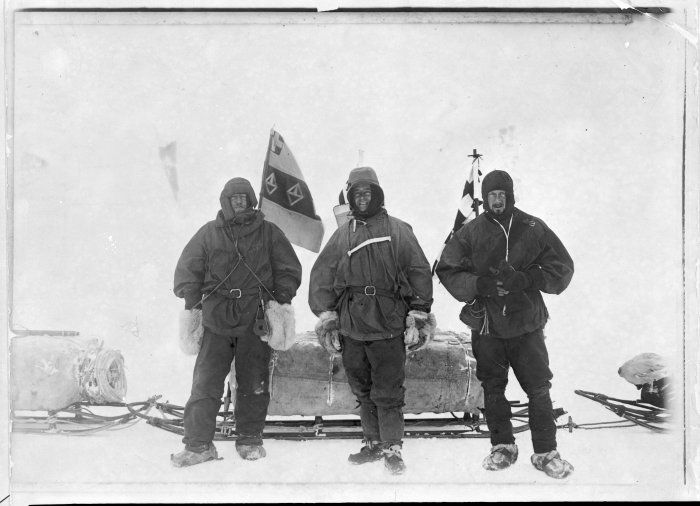2013 & The Urge to Explore
 Sunday, December 30, 2012 at 11:03PM
Sunday, December 30, 2012 at 11:03PM  “Ernest Henry Shackleton, Captain Robert Falcon Scott and Dr. Edward Adrian Wilson on the British National Antarctic Expedition (a.k.a. Discovery-Expedition), 2 Nov 1902.” Image: Wikimedia. PD-US – published in the US before 1923 and public domain in the US.
“Ernest Henry Shackleton, Captain Robert Falcon Scott and Dr. Edward Adrian Wilson on the British National Antarctic Expedition (a.k.a. Discovery-Expedition), 2 Nov 1902.” Image: Wikimedia. PD-US – published in the US before 1923 and public domain in the US.
Tomorrow, The National Geographic Society begins celebrating their 125th anniversary. In a special issue of National Geographic magazine titled Why We Explore, the Society is “kicking off a year of stories about the new age of exploration.” In the article Restless Genes, David Dobbs discusses with Svante Pääbo our Paleolithic ancestor's urge to explore:
No other mammal moves around like we do,” says Svante Pääbo, a director of the Max Plank Institute for Evolutionary Anthropology in Leipzig, Germany, where he uses genetics to study human origins. “We jump borders. We push into new territory even when we have resources where we are. Other animals don’t do this. Other humans either. Neanderthals were around hundreds of thousands of years, but the never spread around the world. In just 50,000 years we covered everything. There’s a kind of madness to it. Sailing out into the ocean, you have no idea on what’s on the other side. And now we go to Mars. We never stop. Why?”
Why indeed? Pääbo and other scientists pondering this question are themselves explorers, walking new ground. They know that they may have to backtrack and regroup at any time. They know that any notion of why we explore might soon face revision as their young disciplines – anthropology, genetics, developmental neuropsychology – turn up new fundamentals. Yet for those trying to figure out what makes humans tick, our urge to explore is irresistible terrain. What gives rise to this madness to explore? What drove us out from Africa and onto the moon and beyond?
Dobb’s goes on to discuss genes that may allow us explore by giving us “great mobility, extraordinary dexterity” and “brains that can think imaginatively.” These three factors form a feedback loop: imagination acted upon by our mobility and ability further fires imagination of what is possible. Our long childhoods also play a role: “we have an unmatched period of protected 'play' in which to learn exploration’s rewards.”
Migratory waves of courageous and exploratory people carry these genes forward, which in a new environment can be further favored. As Dobbs notes, migration “would have selected for multiple genes that favor curiosity, restlessness, innovation, and risk taking” and created another “self-reinforcing loop, amplifying and spreading the genes and trait’s that drive it.”
Finally, we have our tools – such as the ship, compass, sextant, sleds, protective clothing and many other tools that allowed Ernest Shackleton (above) and his team to explore unknown lands.
This New Year, follow your urge to explore. It is our heritage.


Reader Comments